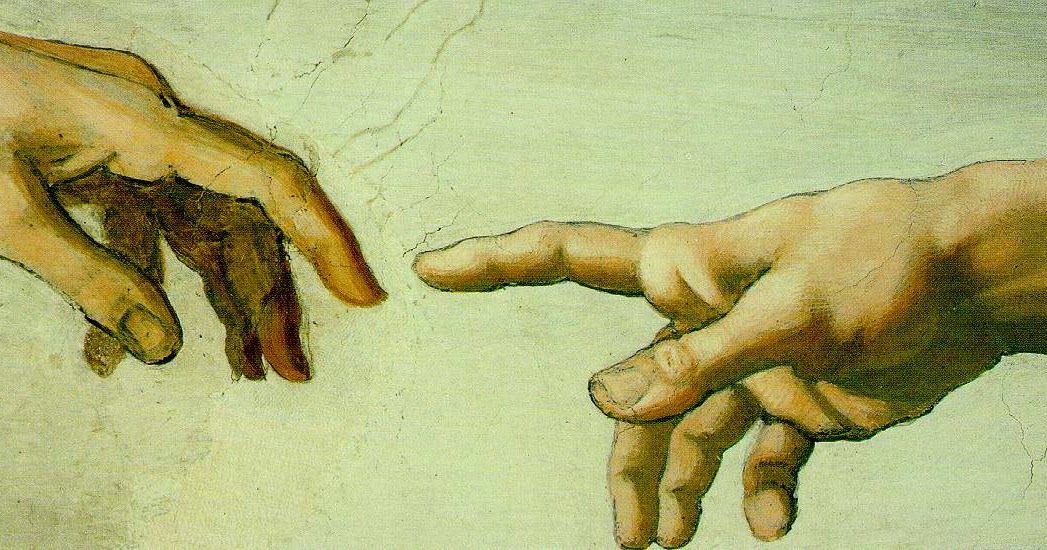Digging Deeper: The Finger of God
Author: Mr. Kenneth Frank | Faculty in Theology, Living Education
Estimated reading time: 8 min.
Did you know, that God is so powerful that He can work mighty miracles merely with His finger?
He truly is the Almighty, Who is omnipotent—all-powerful. He does not have to muster strength to work miracles. In Creation, He spoke the physical world into existence (Genesis 1). However, there are phrases in Scripture referring to His body parts employed for work. This Digging Deeper explores a peculiar expression used in both Testaments that expresses the mighty power of the Creator.
Four times in our Bible, the expression the finger of God appears. To understand what this expression signifies, let us first look at some articles from Bible reference works. Robert Hawker’s Poor Man’s Concordance declares: “This is a very common expression in Scripture, to denote the works of God. Thus the magicians in the court of Pharaoh were compelled to acknowledge the finger of God concerning several of the ten plagues of Egypt which the Lord brought upon the Egyptians” (e-Sword 13.0.0).
Significance of fingers
Fingers were important for conversation in that world, as explained by The International Standard Bible Encyclopedia: “The fingers are to the Oriental essential in conversation; their language is frequently very eloquent and expressive. They often show what the mouth does not dare to utter, especially grave insult and scorn” (e-Sword 13.0.0). Richard Watson’s Biblical and Theological Dictionary expands this thought: “To put forth one’s finger, is a bantering, insulting gesture. ‘If thou take away from the midst of thee the yoke, and the putting out of the finger,’ Isaiah 58:9; if thou take away from the midst of thee the chain, or yoke, wherewith thou loadest thy debtors; and forbear pointing at them, and using jeering or menacing gestures” (Ibid.) In effect, God insulted the Egyptian gods in the characteristic way of that period (Exodus 12:12).
The ISBE continues: “The ‘finger of God,’ like the ‘hand of God,’ is synonymous with power, omnipotence, sometimes with the additional meaning of the infallible evidence of Divine authorship visible in all His works (Psalm 8:3; Luke 11:20), especially in His law (Exodus 8:19; 31:18; Deuteronomy 9:10; compare Exodus 32:15, 32:16)” (e-Sword 13.0.0).
Egyptians versus God’s finger
The first place this phrase appears is: “Then the magicians said unto Pharaoh, This is the finger of God: and Pharaoh’s heart was hardened, and he hearkened not unto them; as the LORD had said” (Exodus 8:19 KJV throughout). This was what the magicians concluded during the third plague of lice upon Egypt. Albert Barnes’ Notes on the Bible reports: “This expression is thoroughly Egyptian; it need not imply that the magicians recognized Yahweh, the God who performed the marvel. They may possibly have referred it to as a god that was hostile to their own protectors” (e-Sword 13.0.0). Notice that they did not attribute this plague to the power of YHVH, the covenant name of God with Israel, but to elohim. Elohim is a word referring to any god. They acknowledged this was the result of the power of a god.
The Expository Notes of Dr. Constable explains: “The ‘finger of God’ (Exodus 8:19) is a phrase denoting creative omnipotence in Scripture (Exodus 31:18; Psalm 8:3; Luke 11:20)” (Ibid.). God was superior in power to all the Egyptian gods. We may wonder why the finger was chosen. Henry Morris’ Defender’s Study Bible provides this historical note: “Egyptian magical texts occasionally refer to ‘the finger of’ one of their gods or goddesses. Here they recognize the miracle as emanating from the finger of the true God of creation” (Ibid.). Dr. Peter Pett’s Commentary explains further: “In Egyptian texts we find reference to the ‘finger of Seth’ and ‘the finger of Thoth’. This was thus a typically Egyptian way of expressing the situation. We would say, ‘God must have had a hand in this.’ Note the use of ‘God.’ They were not thinking of Yahweh specifically, but of the divine” (Ibid.).
In this biblical text, the magicians were helpless in overturning this plague of lice. Matthew Henry’s Commentary on the Whole Bible perceptively notes: “God has the devil in a chain, and limits him both as a deceiver and as a destroyer; hitherto he shall come, but no further. The devil’s agents when God permitted them, could do great things; but when he laid an embargo upon them, though but with his finger, they could do nothing” (e-Sword 13.0.0)
Writing on stone
Our next two references relate to God’s inscribing the 10 Commandments on two stone tablets:
“And he gave unto Moses, when he had made an end of communing with him upon mount Sinai, two tables of testimony, tables of stone, written with the finger of God” (Exodus 31:18).
“And the LORD delivered unto me two tables of stone written with the finger of God; and on them was written according to all the words, which the LORD spake with you in the mount out of the midst of the fire in the day of the assembly” (Deuteronomy 9:10).
God made it truly clear that the 10 Commandments originated with God, not Moses. It ought to be referred to as “God’s law.” It is the “Mosaic law” only in a secondary and derivative sense. Henry Morris’ Defender’s Study Bible comments: “The fact that the Ten Commandments were written on stone by God Himself is stressed no less than seven times (Exodus 31:18; 32:15; 34:1,28; Deuteronomy 4:13; 9:10; 10:4). This is an indication of the importance placed by God on these stone-inscribed words” (e-Sword 13.0.0). Again, Morris states: “The fact that God wrote the Ten Commandments down Himself, rather than through a prophet, indicates the unique importance He places on these ten laws, as the foundation for all human legal systems. Also see note on Deuteronomy 9:10” (Ibid.)
We may wonder how God did it. Ellicott’s Commentary for English Readers addresses this question: ” We must understand that the tables were inscribed by some supernatural process, and not by any human hand. The exact nature of the supernatural process is not revealed to us” (e-Sword 13.0.0). Similarly, only He can inscribe His law on the hearts of Christians by the Spirit today (2 Corinthians 3:3). On the permanence of God’s law, notice David Guzik’s comment in his Enduring Word Commentary: “We often say that something can be changed because ‘it’s not written in stone.’ These commandments were written in stone” (Ibid.).
The Cambridge Bible for Schools and Colleges adds an important historical explanation on Exodus 31:18: “The practice of inscribing laws on tables of metal or stone was very general in antiquity: Rome, Athens, Crete, Carthage, Palmyra, Babylonia, all supply examples…That the tables on which the Decalogue was written are said to have been inscribed by ‘the finger of God’ (cf. Exodus 34:1) is an expression (Di.) of the sanctity and venerable antiquity attributed to them” (e-Sword 13.0.0). Its comment on Deuteronomy 9:10 is also insightful: “With His own voice, face to face, God spake the words of the covenant (Deuteronomy 4:12 f., Deuteronomy 5:4) and now with His own finger wrote them. Thus by a double metaphor is the directly divine origin and supreme sanctity of the Ten Words emphasised” (Ibid.). God’s spoken word and hands were significant in the Creation as well: (Psalm 8:3; 33:6).
Power in His finger
Our last reference comes from Jesus’ confrontation with critics who accused Him of employing the power of Beelzebub to work miracles. Instead, He declared: “But if I with the finger of God cast out devils, no doubt the kingdom of God is come upon you” (Luke 11:20). In Matthew’s parallel passage, Jesus stated he cast out devils by the Spirit of God (Matthew 12:28). The finger of God works miracles by the Spirit of God. Ellicott’s Commentary for English Readers notes: “As the ‘hand’ denotes power generally, so the ‘finger’ symbolises power in its concentrated and specially-directed energy” (e-Sword 13.0.0). Gary H. Everett’s Study Notes on the Holy Scriptures adds: “The Scriptures use the phrase ‘hand of God,’ or ‘power of God’ to express God reaching down to mankind in a display of mighty power. In contrast, the phrase ‘finger of God’ seems to indicate that God is able to cast out devils with very little effort” (Ibid.).
Christians serve a mighty Savior Who was Israel’s God of the Old Testament and Who thwarted Pharaoh and his magicians, inscribed the 10 Commandments on stone tablets, and cast out devils with merely His finger. Though symbolic, these verses demonstrate that Christ is the Almighty Creator and Savior. He is invincible. When He returns to earth, He will once again exercise His mighty power to deliver His people and establish the Kingdom of God.

Kenneth Frank was born and raised in New Jersey, USA, and attended Ambassador College, graduating in 1973. He served in the Canadian ministry from 1973-1999, after which he returned to the USA to pastor churches in Maryland, Virginia, and North Carolina for 15 years. Having earned a BA degree from Ambassador College he later earned a MA degree from Grand Canyon University before being assigned to the Charlotte office to teach at Living University, now Living Education. Currently, he teaches the Survey of the Bible course to the on-campus students and writes the Digging Deeper column for our online Bible study program. He is married, has four children, and seven grandchildren.









